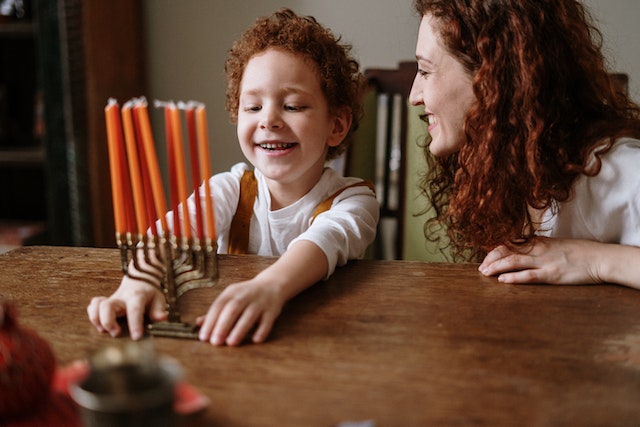
It’s no secret that kids are less involved with the Jewish community than previous generations. If you have children, you know how hard it can be to get them interested in Judaism. But there are ways to get your kids excited about Jewish life. Here are a few suggestions:
1. Make it fun!
Take your kids to Shabbat services, or invite them along when you visit an elderly relative. Once they see how much fun Shabbat is, they might decide to try it themselves. Also, find out what interests them — and use it to connect with Judaism. If your child loves sports, take them to watch a game at a local Jewish school or synagogue; if they love science, take them on field trips to science museums; if she likes art, see art exhibits together; if he enjoys music, attend concerts by local Jewish musicians; if she likes animals, visit zoos or wildlife sanctuaries on weekends; if he loves history and culture (or wants to learn more about where he comes from), show him documentaries about Israel and other parts of the world where Jews live today — then ask him questions about what he learned.
2. Teach them about Judaism
The best way to get your child interested in Judaism is to expose them to it early and often. Read them Jewish children’s books so they can learn the history at a young age but at their reading level. Let them experience Shabbat by lighting candles and saying blessings at home, then take them to services at your local synagogue or temple so they can see what Shabbat looks like in action. Take them on trips to Israel, where they can visit holy sites like the Western Wall and Masada — where you can share stories about the people who fought for our freedom from Egypt thousands of years ago.
3. Don’t push your own beliefs on them; listen to theirs
One of the best ways to get kids thinking critically about their beliefs is by asking them questions — not necessarily about Judaism, but generally about life and the world around them. What do they think about that topic? Why do they feel that way? What would they change if they could? Questions like these may yield surprising answers that lead your children into new ways of thinking about religion (or anything else). And don’t force them into religious activities or events if they’re not interested. Let them decide how much involvement in Judaism makes sense at this stage in their lives. Some kids will want to attend religious school every day; others might want nothing more than a bat mitzvah party with friends and family. Neither choice is wrong — as long as you respect your child’s wishes and allow them.
4. Show them how to be a mensch
When you show your kids how to be kind, thoughtful, and generous, they’ll learn how important these values are in Jewish life. If you live in a community with plenty of volunteering opportunities, take advantage of those opportunities with your kids. Show them how fulfilling it is to help others, whether it’s feeding the homeless or packing meals for a food bank. If volunteer work isn’t available where you live, find other ways for your kids to practice being good people. For example, teach them how to make sandwiches when hungry instead of complaining about not having enough food at home or giving money away when they see someone on the street who needs help.
5. Connect with others through social media
Kids can be resistant to things they don’t understand. But if you can find a way to make your kids’ Jewish heritage and identity relevant to their lives, they may be more willing to take part in the traditions. One way is to connect with others through social media. If your child has an account on Facebook or Instagram, and you do as well, share some of your photos from family celebrations or holidays. Include captions that explain what’s happening and why it’s important for everyone there. You might also share photos of other people’s kids at events like bar mitzvahs, allowing your child to see that other kids are having fun at these events.
Learn about your child and their personality. Take note of the important things, how they learn best, and what they like. If any of these things are traits of Jewish children and you hope to see them in your offspring, talk with your spouse about how you can make this happen.


